|
It's April, which means it's Happy National Poetry Month (NaPoMo) 2023. I hope you'll enjoy coming back here each day this April, for a poetry prompt or two. Happy writing!
* * * 30 April In a poem, explore what it means to outlast or outlive (something or someone). 29 April There are any of a number of human-made or synthetic things that bear some kind of resemblance to a natural thing or object. For instance, a bomb looks like a pomegranate, a grenade like a pine cone or a pineapple; a traffic light like a tray of red, yellow, and green bell peppers; a handheld fan like a ginkgo leaf; a pincushion like a sea urchin. Write a poem in which you incorporate this kind of cross-image-making, which then also serves to add to the poem's subject and "meaning." 28 April Write a poem in which you explore the texture of things, or the texture of some experience. If you can, look for or create a new word or two to capture its distinctness. For instance, throughout her new book, poet Claire Wahmanholm uses the word "meltwater" - which means water formed by the melting of snow and ice, especially from a glacier. 27 April To curate means to organize and present a collection, perhaps according to a theme or the category to which the objects or specimens belong. Write a poem which could be seen to curate a selection of images or material objects that are connected to each other. For example, if you were to write an "Animal Crossing" poem, what would be on your island? 26 April There are some styles of woodworking where no metal is used. There is a Japanese technique called Sashimono, for instance, which (instead of nails or hinges) uses carved mortises and grooves to join parts of furniture so that the surface appears seamless. Sometimes, we use "seamlessness" to describe a quality achieved by art/writing — by which I think we mean that the labor or craft behind the doing of the thing, is not visible. Maybe the lines or images seem to enter the poem as if without effort. Maybe this is what's meant when writers talk about sound and sense being one. But there are also other folk art traditions in which the mistake, the visible seam, is deliberately incuded in the work, sometimes as a way in which the artist(an) might acknowledge that they participate in the greater creative energy of the universe... Write a poem in a form of your choosing, but include a deliberate departure or swerve away from the form. Make that difference not a mistake, but another place in which you can introduce another layer of meaning or experience in the poem. 25 April What words would you say form your (current) poetic vocabulary? Pick one, and write a poem exploring its meanings; let it also move you toward whatever else it suggests. If it works, use this word as the title. 24 April One of the Annie Dillard quotes I come back to often is this one: “One of the things I know about writing is this: spend it all, shoot it, play it, lose it, all, right away, every time. Do not hoard what seems good for a later place in the book or for another book; give it, give it all, give it now. The impulse to save something good for a better place later is the signal to spend it now. Something more will arise for later, something better. These things fill from behind, from beneath, like well water. Similarly, the impulse to keep to yourself what you have learned is not only shameful, it is destructive. Anything you do not give freely and abundantly becomes lost to you. You open your safe and find ashes.” What are a few things you've been keeping/saving for some imagined better time or place in the future? Take them out of the safe and write (about) them. 23 April Write a poem in which you walk an answer (or something you already know) back to a time when you didn't know... What was that like? 22 April What comes to mind when you think of "balm?" Write an ode to what soothes - a burn, a callus, your thirst or sleeplessness. 21 April Does it sometimes feel that you are trying to sing in the darkness, or trying to write poems to celebrate what yet remains to be seen, or is yet to come? During such times, I try to remember that elegy is only the other face of the ode. Write a poem in which someone specific (who is your poem’s persona?) makes amends, rights a wrong, reveals the truth instead of a lie, brings back or returns something that was taken. Write a poem celebrating these gestures and pointing out an opening. In your poem, include the following: the name of a specific street or place; an animal and the sound it makes; a tactile experience (reference to texture/touch); a compound word (ex. battleship, crowbar). 20 April Are there things you used to love when you were younger that for some reason you don’t, now? What does that change mean to you? Are you able to come back to that thing you avoided or cast off for a long time, and see how you can love it again? Here are 3 poems to read as you think about and write to this prompt-- Naomi Shihab Nye, “Boy and Egg” Leila Chatti, “Ode to Ugly Things” Tyree Daye, “Tamed” 19 April Jake Skeets once said in an interview: “…We talk about the violence that still occurs. Of course, this may not seem joyful but I define joy differently than its greeting-card definition. Joy back home is always mixed with an observation of the challenges. Joy back home is not just ecstatic-outward joy. Joy, for us, is deep reflective joy. Joy is also the work we put into our relationships and responsibilities. Our joy is a joy called joy and a joy called survival.” Write a poem about the many forms of your joy, not just the "ecstatic-outward joy." 18 April It's spring, and the pollen count is high. Pick 7 random words from out of a book or dictionary, and use these to seed a poem. 17 April Write an Emoji poem. Using your phone text messaging, write down lines of random emojis (or get someone to text them to you). Aim for at least 12 - 14 lines. Now, "translate" the emoji lines into a poem. 16 April What toggles a particular memory loose from the larger collection of one's memories? Go through the five senses: sight, smell, hearing, touch, taste (according to scientists, there is at least one more sense: proprioception, meaning, one's perception of the body's movement in or through space)— Look at a specific thing, smell a specific thing, listen to a specific sound, etc. Write down what associations come to mind. Write a poem about the strongest memory this exercise allows you to find your way to. 15 April Sometimes, making a list can be a way to find grounding. For instance, in Dorianne Laux's poem "What's Broken," the litany she names ranges from sky to stem, roots to grass, beads from a necklace of long-ago days. Pick a similar category—What's half? What's whole? What's mine, or yours?—and write a poem that uses the list as the primary organizing principle. Let the images and concrete description do the work—try not to explain them. 14 April What kinds of flora and fauna are native to the place where you live now? to the place you came from, if you are from somewhere else? Is there any one of these that fascinates you — for its name, the stories around it, its properties, its uses? Write an ode to it. 13 April Have you ever written a letter that for some reason you never sent to its intended recipient? Write a letter poem addressed to someone or something that won't ever see or read it; what would you say in it? 12 April Enter your name into a Google search field. See who else has your name, see if you can glean something about what they do. Pick one "doppelgänger" and write about this alternate "you"'s life. 11 April Pick up/take note of/or take a picture of three random things you see on your way to or from home—a crumpled coffee cup? a belt buckle? a gas station receipt? Put them together in a poem. What story do they tell? 10 April How long can a breath be held? How long, exactly, can a fermata hold, especially since it is defined as a rest or duration of unspecified length? And how do we hold what cannot be held? Write about a kind of holding. 9 April Not enough time. Time out. Time-bound. Running out of time. In the nick of time. Timed. What would it be like to have enough time? Write a poem in which you imagine what that might be like. 8 April Yes, I'm nerdy, and I play Wordle too... How about we turn it into a poem form? Write a 6-line poem (individual lines can be short or long; no need for rhyme or meter). Use a five-letter word in the first line, and manipulate that word so you change one letter each time in the succeeding lines, until you come to the last/6th line. In your last line, you should have a five-letter word whose "evolution" you can track from the first line. 7 April Write a poem in the voice of a whale. 6 April One of my favorite surreal artists is Leonora Carrington, who was born on this day in 1917. I adore her "Self Portrait (Inn of the Dawn Horse)." I remember coming across this feature on her in which the writer, Merve Emre, describes how she "had been made," instead of born: "One melancholy day, her mother, bloated by chocolate truffles, oyster purée, and cold pheasant, feeling fat and listless and undesirable, had lain on top of a machine. The machine was a marvellous contraption, designed to extract hundreds of gallons of semen from animals—pigs, cockerels, stallions, urchins, bats, ducks—and, one can imagine, bring its user to the most spectacular orgasm, turning her whole sad, sick being inside out and upside down. From this communion of human, animal, and machine, Leonora was conceived. When she emerged, on April 6, 1917, England shook." Write a poem that remakes your own "origin story." 5 April There are sayings which I find maddening because they seem to have the power to fix you in one spot, after which you (or I) feel absolutely superglued to the condition. For example, "One is only as happy as their saddest child." Or, "You made your bed, you lie in it." But, I mean, who has such omniscience over another?? Write a poem that argues against one such saying, and goes in a different direction toward a different possibility or outcome. 4 April This week, in my Craft of Poetry class, we are discussing and writing Ekphrastic poems. I like to think of ekphrasis not as a caption to visual art— but as a way to let our psyches simply be engaged by the nonverbal. Aided by memory and imagery, visual art can make us feel invited to come into or revisit experiences that might sometimes be too difficult to approach. Write an ekphrastic poem in response to a work of art that recently caught your attention or that you could not so easily forget. 3 April What is your talismanic animal, your myth-muse, your amulet or anting-anting? Write a poem about this: what are its characteristics, its powers, its weaknesses and flaws? how did it come to you? how did you discover it, or birth it, or adoit? What is its name? Where does it sleep? How do you carry it with you in the world? 2 April Dear Rainer Maria Rilke, in Letter 4 of your Letters to a Young Poet, you say: "Be patient toward all that is unsolved in your heart and try to love the questions themselves, like locked rooms and like books that are now written in a very foreign tongue. Do not now seek the answers, which cannot be given you because you would not be able to live them...." You got that part right, about the locked rooms and the unreadable texts, about all that keeps you out and won't let you in, about what you can't seem to see for the doubt or sorrow or the wound, And oh, Rilke, this is so f****** hard. You know I am not a patient one. You say, perhaps someday we will "live...into the answer." (Key word: perhaps.) Write a poem about one of those questions "unsolved in your heart" right now, in this space and time. What do you do when you seethe in dreams, behind your screens, wanting those answers, wanting to figure things out? 1 April Fool: according to dictionaries of etymology--from the early 13c., "silly, stupid, or ignorant person," from Old French fol "madman, insane person; idiot; rogue; jester," also "blacksmith's bellows," also an adjective meaning "mad, insane" (12c., Modern French fou), from Medieval Latin follus (adj.) "foolish," from Latin follis "bellows, leather bag," from PIE root *bhel- (2) "to blow, swell." But in the Tarot, the Fool might represent a state of inexperience and incompleteness that can be childlike and trusting; that can stand for a new beginning. As Cervantes said in Don Quixote, "“When life itself seems lunatic, who knows where madness lies? Perhaps to be too practical is madness. To surrender dreams — this may be madness. Too much sanity may be madness — and maddest of all: to see life as it is, and not as it should be!” Write a poem about this kind of foolishness: leaning into spontaneity, or believing in luck or something good despite the haters or naysayers.
0 Comments
Here we are again, friends — one of my favorite times of the year kicks off on the 1st of April:
National Poetry Month. I love what our current US Poet Laureate, Ada Limón, says about what poetry does, what it can do, that other more "transactional" kinds of language don't appear able to do-- “I didn’t sign up for anything limited when I chose poetry... I signed up for something that is about trying, on some level, to harness the unsayable.” Come back to find a new poetry prompt here, every day this April. Upon careful review, the Editorial Board of the Black Lawrence Immigrant Writing Series has selected Caulbearer: Poems by Luisa A. Igloria as the Winner of its Black Lawrence immigrant Writing Series Prize. The collection will be released by June 2024.
|
"In these bruising days, Archives
June 2024
Categories |
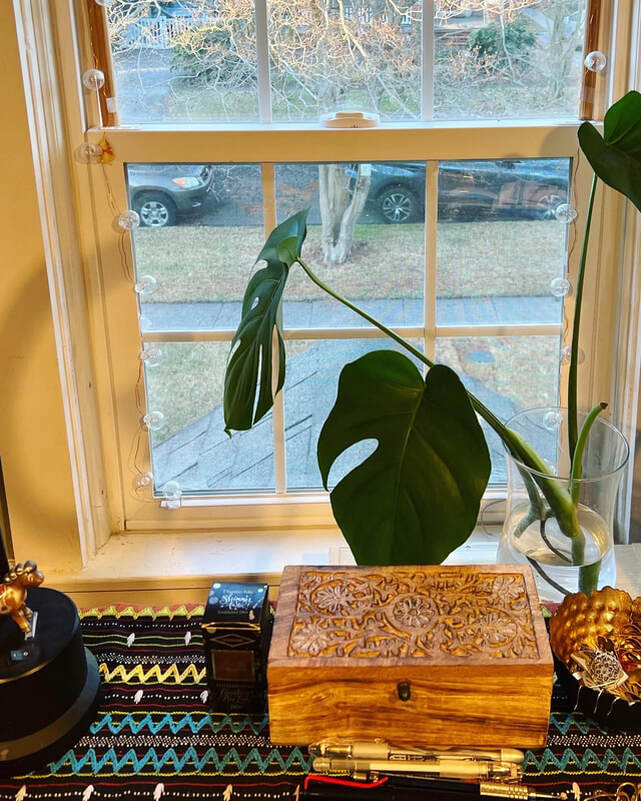
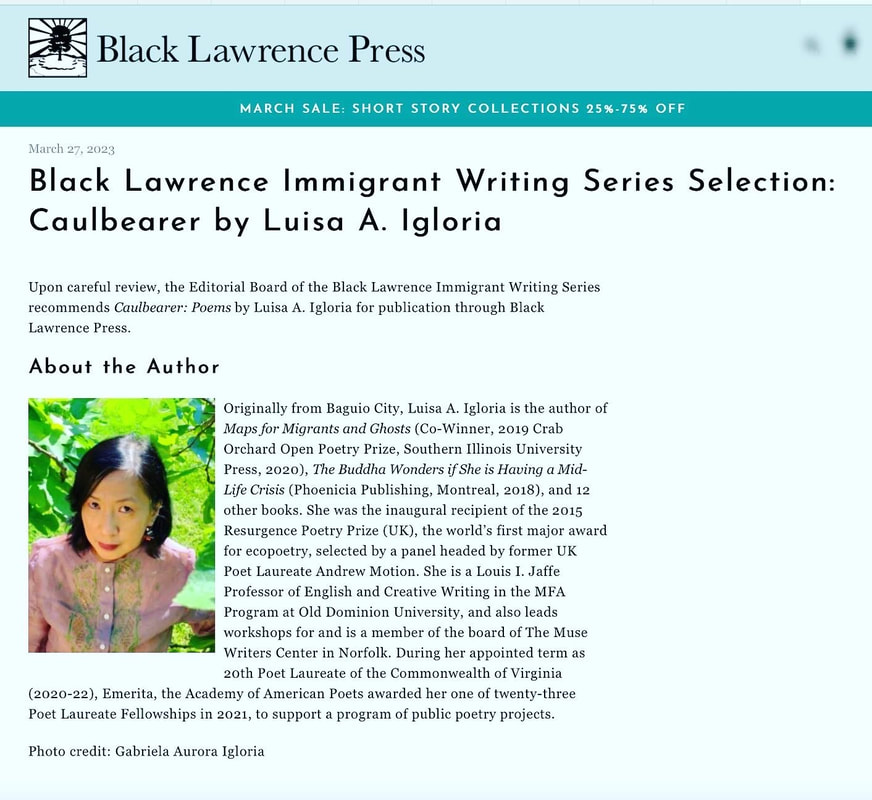
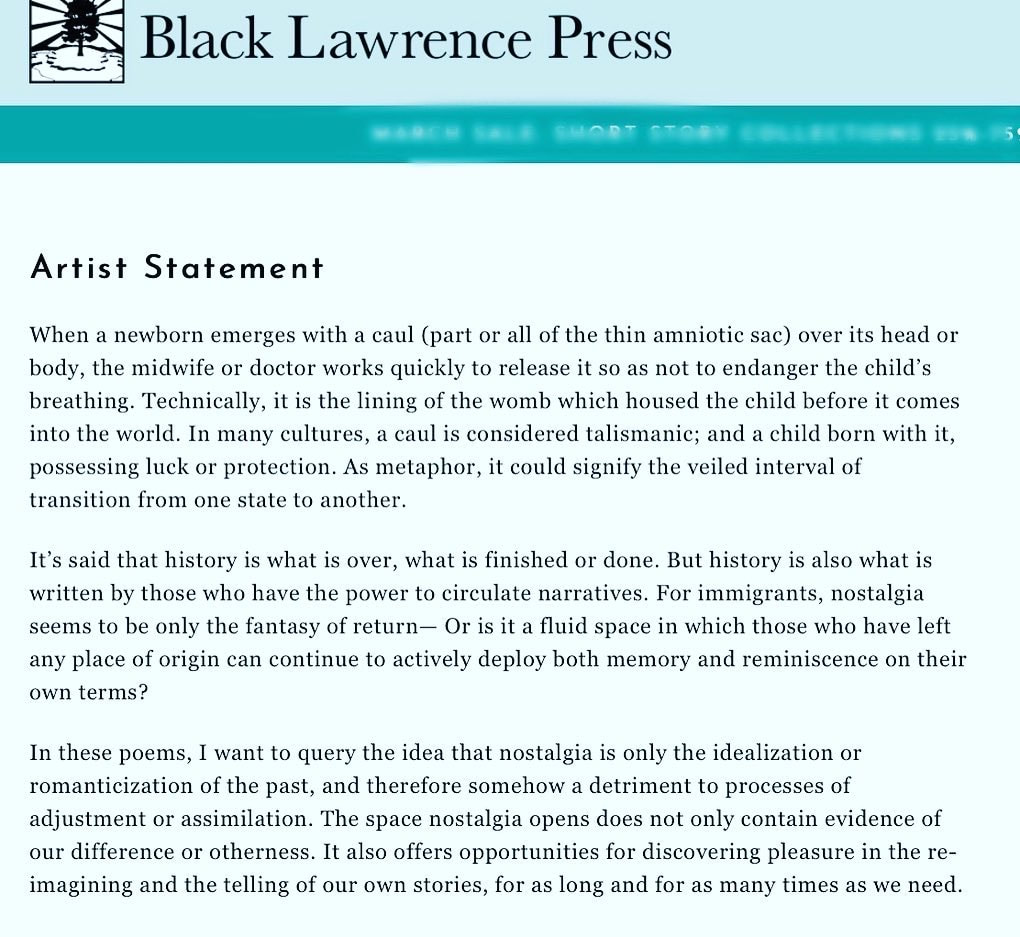
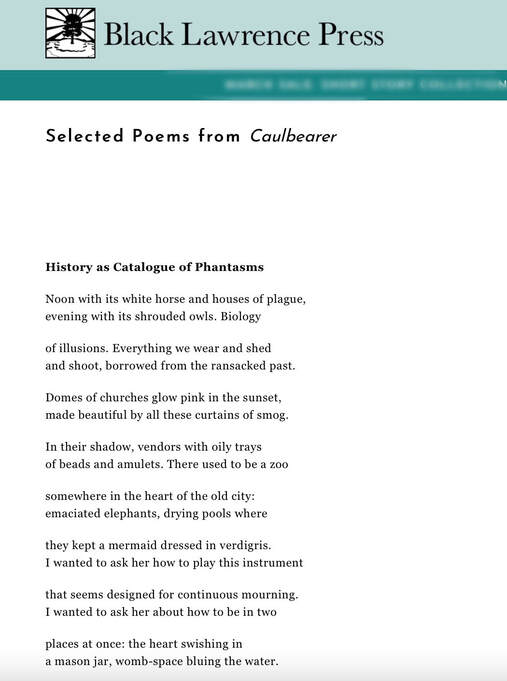
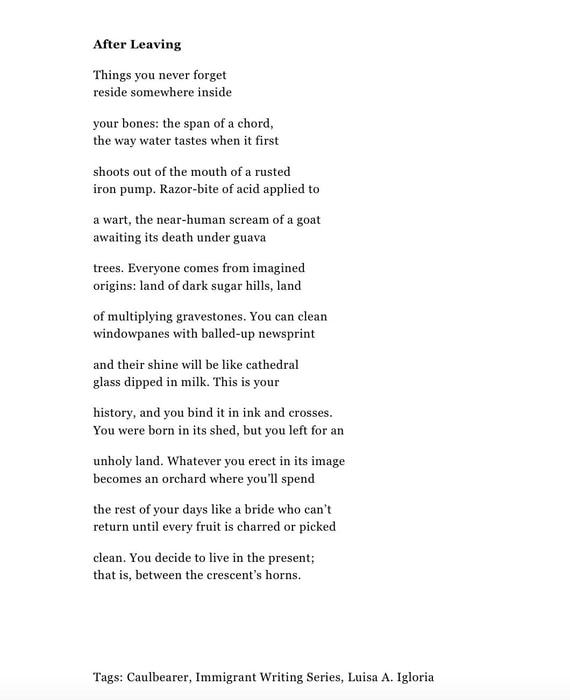
 RSS Feed
RSS Feed